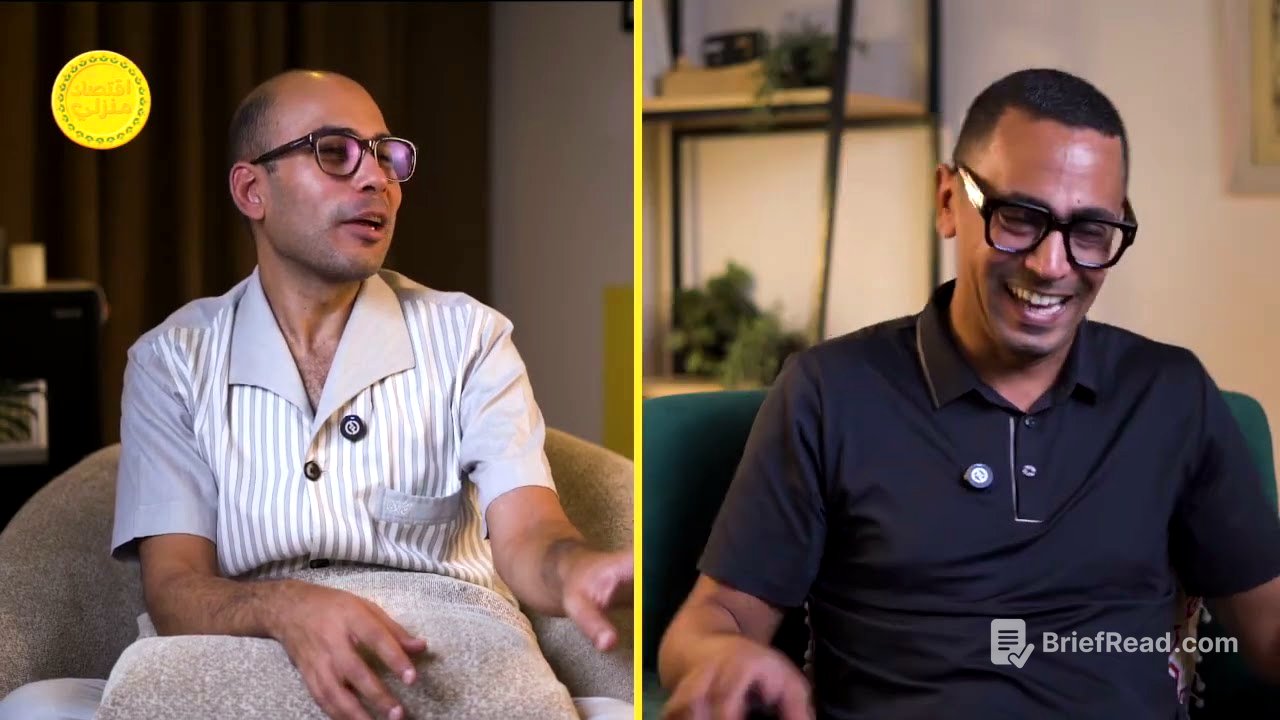TLDR;
This video features a discussion about investment funds with Ahmed Morshed, an expert in the field. They explain what investment funds are, the different types available in Egypt, how profits are distributed, and where to access these funds. They also discuss the importance of understanding investment principles, diversification, and the role of regulatory authorities in ensuring the safety of investments. The conversation covers both Egyptian pound and foreign currency investment options, and concludes with advice on how to approach investing based on individual financial situations and risk tolerance.
- Investment funds are like a bus, fund manager is a driver and Financial Regulatory Authority is who gives license to driver.
- Diversification is very important.
- Respect the investment principle that you are working in.
Intro [0:00]
The host introduces Ahmed Morshed, an investment fund expert, to discuss and answer questions about investment funds, which are presented as a good alternative to traditional certificates of deposit.
What are Investment Funds? [0:43]
Investment funds are described as a "joint financial vessel" where investors with similar goals pool their money. Using an analogy, the investment fund is a bus that takes you to a specific financial destination. People invest in these funds because they may lack the expertise to navigate the market themselves. Different funds cater to different risk appetites, with cash funds being low-risk and stock investment funds being higher-risk but potentially more rewarding. The fund manager is the driver, a professional who navigates the market, and is licensed by the Financial Regulatory Authority.
Types of Investment Funds in Egypt [2:56]
In Egypt, the most common type is the cash investment fund, which invests in treasury bills—short-term debt issued by the Central Bank on behalf of the Ministry of Finance. Stock investment funds invest in a variety of stocks, bundled together and managed by a fund manager. Fixed-income instrument funds invest in longer-term instruments like bonds and Sukuk. Balanced funds combine cash and stocks, typically in a 60/40 ratio, for those seeking moderate growth with some security. Gold funds invest in physical gold, offering a regulated way to invest in gold. Real estate investment funds are emerging, allowing investment in real estate with smaller subscriptions.
Profit Distribution in Investment Funds [6:55]
The profits in investment funds are distributed based on the increase in the value of fund units, which can be thought of as "gold pounds." Investors buy these units, and their value increases over time as the fund's investments grow. Some funds also distribute returns monthly or annually. Compound funds, which reinvest profits to increase the value of the unit, are favored for their potential for greater returns compared to funds that distribute profits. Cash funds increase interest on the original amount every day.
Accessibility and Availability of Investment Funds [10:32]
Investment funds are available not only in banks but also through various applications. Before 2020, they were primarily offered by banks, but now asset managers can also establish them. Banks may not always promote investment funds because they generate less profit compared to traditional banking products. Cash funds offer daily returns and are easily accessible through applications. They also provide tax advantages for companies.
Regulation and Supervision of Investment Funds [14:11]
The Central Bank supervises banks, while the Financial Regulatory Authority oversees non-banking financial entities, including investment applications and fund management companies. All legitimate applications must be licensed and monitored by the Financial Regulatory Authority. Investors should verify the legitimacy of any financial entity on the Authority's website (FRA.gov.eg) and check for blacklists of unlicensed companies.
Assessing Investment Gains and Losses [17:37]
To determine investment gains, it's important to understand short, medium, and long-term investment horizons. Short-term is less than a year, medium-term is one to three years, and long-term is over three years. Investors should diversify their portfolios and consider inflation when assessing returns. Preserving the value of money is a key principle, especially during periods of high inflation.
The Egyptian Mentality and Investment [22:06]
Egyptians sometimes try to outsmart the market, which can lead to losses. It's crucial to respect the characteristics of the investment asset and adhere to appropriate time frames. Gold, stocks, and real estate are generally long-term investments. Speculation and flipping assets can be risky.
Investment Funds for Minors and Currency Options [27:11]
Individuals as young as 15 or 16 can invest in funds with a card. Investment funds are available in currencies other than the Egyptian pound, such as the US dollar and Euro. While Euro funds exist, dollar funds are more common due to higher interest rates.
Investing in Egyptian Funds from Abroad [29:29]
It is possible to invest in Egyptian investment funds from anywhere in the world, provided certain conditions are met. Digital onboarding requires a valid national ID, a phone number registered in the investor's name, and the latest version of their national ID card. Non-Egyptians can also invest, subject to specific conditions set by the Financial Regulatory Authority.
Potential Problems and Information Sources [33:02]
Investors should thoroughly research any fund before investing. Complete information is available on all investment applications, including the fund's prospectus, investment policy, and risk ratio. Contacting the asset manager for the prospectus is also an option.
Dividing Investments with Limited Capital [34:50]
With limited capital, such as 5,500 pounds, it's advisable to allocate 10-15% to a cash fund for emergencies, 15-20% to long-term gold, and the remainder to stock investment funds, especially for younger investors. Examples of cash funds include Easy Hala, Easy Nasser, and Beltone’s B-Secure.
Sector Funds and Potential Losses [39:46]
Sector funds invest in specific sectors of the market, such as education or healthcare. While it's possible to lose money in investment funds, especially stock funds, fund managers aim to mitigate losses by adjusting investments based on market conditions. They may withdraw investments from stocks and place them in safer assets like treasury bills.
Expert Fund Managers and Gold Investment [44:38]
The speakers highlight some of the cleverest and most knowledgeable fund managers in Egypt from Azimut, Beltone and CI Capital. When investing in gold, both physical gold and gold investment funds are viable options. Gold investment funds offer fractional buying and selling, allowing investors to invest small amounts.
The Future of the Egyptian Pound and Investment Strategies [53:13]
The discussion touches on the potential for a future float of the Egyptian pound, but notes that current economic indicators suggest it is unlikely due to strong foreign currency inflows. The speakers advise against converting currency based on speculation and emphasize the importance of having both Egyptian pounds and dollars for investment.
Investment Options with Dollars in Egypt [1:03:08]
For those with dollars in Egypt, investment options include savings accounts, certificates of deposit, daily investment funds, and fixed-income funds. Investing in dollar-denominated stocks on the Egyptian Stock Exchange is another option. The speakers recommend gold for smaller amounts and caution against keeping large amounts of cash at home.
Maturity Funds and Investment Choices [1:06:19]
Maturity funds invest in dollar-denominated bonds with a specific term, offering a fixed return until maturity. When choosing between investment funds and certificates of deposit, it's essential to consider individual financial goals, risk tolerance, and income needs.
Personalized Investment Advice and Strategies [1:08:09]
The speakers stress the importance of personalized investment advice based on individual circumstances. They advise against following herd behavior and recommend assessing income, expenses, and financial goals before making investment decisions. They also highlight the current trend towards more cash holdings due to market volatility.
Real Estate Investment and Risk Tolerance [1:13:01]
For real estate investments, breaking down large properties into smaller units can make them easier to sell and more attractive to a wider range of buyers. The speakers conclude by sharing their personal investment preferences, which include a mix of stocks, investment funds, and gold, with a higher allocation to stocks.









